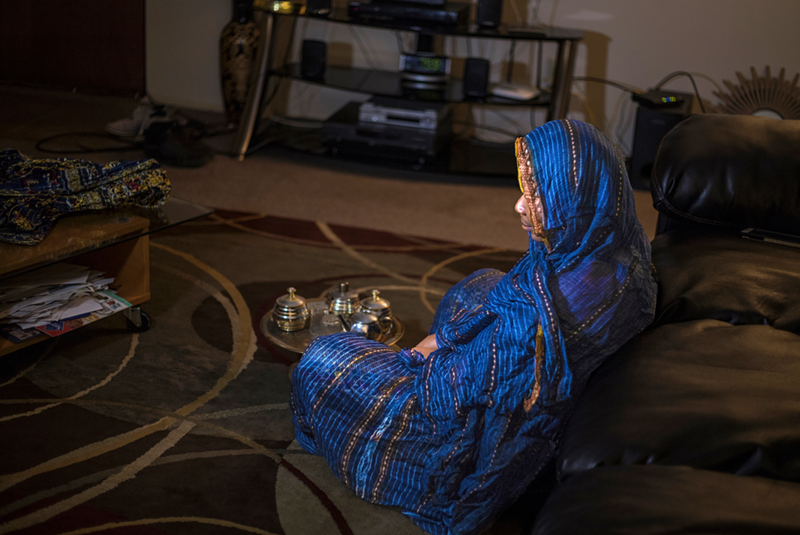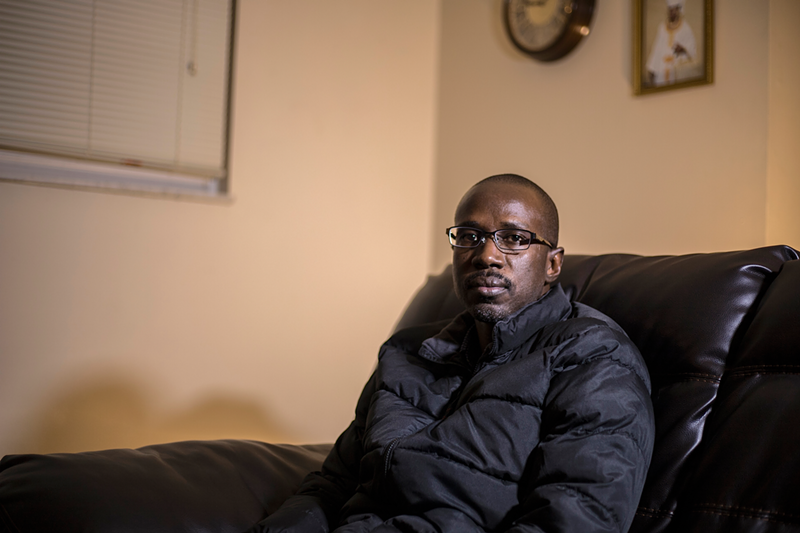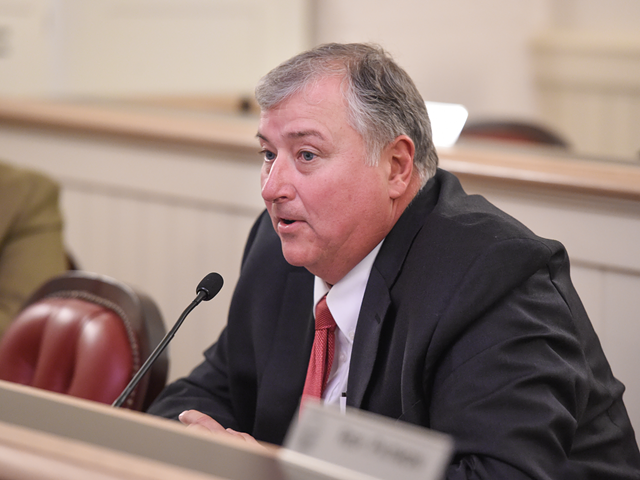In 1987, when Aissata was 12, her father fled their native Mauritania to escape arrest by the government for his racial identity and political activism. He left quickly, without even the time to say goodbye.
She didn’t see him again for 19 years as he hid — first in neighboring Senegal, and then in the United States, where he arrived in 2000 as a refugee.
Aissata, who asked that we not use her last name, came to America later, in 2008, following one of her brothers to Greater Cincinnati. He was granted asylum. But because the process can be frustratingly arbitrary and hinges on an intricate succession of paperwork and appointments, Aissata never was.
Others share her fate: sometimes because they relied on friends who were not immigration attorneys, sometimes because judges saw a series of similar stories about the conditions in Mauritania and got suspicious.
Now, there is the distinct possibility that an ocean and politics will again come between Aissata and her father as she faces removal proceedings by United States immigration authorities enforcing strict new policies by the Trump administration.
If she is picked up by Immigration and Customs Enforcement agents, she will likely be deported back to the coastal west African country where she experienced menacing and beatings from government security forces, where black residents like her are still denied basic civil rights and where the United Nations says an estimated 10 to 20 percent of the population is held in hereditary slavery.
Ohio has the densest population of people from Mauritania in the United States — roughly 6,000, by some estimates, including 3,000 in Columbus and another large population on the suburban fringes of Cincinnati.
Many didn’t know each other when they came here, but they have knitted together a community, attending local mosques and sometimes celebrating at barbecues and evening get-togethers.
They married, had children, started businesses, bought houses.
Those like Aissata who saw brutal violence as part of a crackdown on black Mauritanians by an Arab ruling class called Beydanes in the late 1980s tended mental and physical wounds, slowly finding some equilibrium and normalcy here.
But those who did not get their asylum claims granted by federal judges are slowly disappearing, seized by ICE officers. Once picked up, they are subject to long stays in places like the Butler County Jail and federal holding facilities and, eventually, deportation back to Mauritania.
There, they face imprisonment — or worse.
Returned to Danger
Abdoulaye Sow fled Mauritania for the United States in 2001. After scrimping by for a few years in New York to pay off the legal costs of getting asylum, he heeded advice from Mauritanians who came previously and headed to the Ohio State University. He received a degree that landed him a job in the banking industry, spent a few years in Texas, then came to Cincinnati to settle down. Now, he owns a home in the Cincinnati suburbs he shares with his wife and two children.
Sow’s other job — after his full-time gig and role as a family man — is activism. He works for a group called the Mauritanian Network for Human Rights in the United States, where he advocates for the rights of people like Aissata.
Sow says the cause has become ever more vital over the past few years.
“Everything started to change when the Trump administration took office,” he says. “Arrests started increasing a lot. Under the previous administration, even if a judge didn’t grant you asylum, usually they would give you a work authorization. With that you could do anything anyone else could do. You could work, raise your family, do the important things.”
Under the Obama administration, which generally prioritized the deportation of those who had committed crimes, people from Mauritania could check in roughly once a year, and as long as they steered clear of legal trouble, they were issued authorization to work in the United States.
But under the Trump administration, people without criminal records go to check in and get arrested. Even when they are not immediately detained, the message is often clear: you are not welcome.
“I went to the ICE office in Columbus to try and renew my work permit, but I wasn’t treated well," Aissata says. "I was told I need to go back to my country, that they don’t want me here. Ever since I’ve been here, I’ve never been treated like that."
The shift is easy to see in the numbers — only 10 Mauritanians were deported by the federal government in 2016, the last year of the Obama administration. Last year, 98 were sent back to Mauritania, and many others were detained. Almost all were Ohioans.
Many congressional Democrats blasted the detentions and deportations last year, but to little effect.
Other Ohio-based groups, including a Columbus-based advocacy organization called the Ohio Immigrant Alliance, are working on advocating and providing legal help for black Mauritanians fearing deportation.
"What Trump did was prioritize deporting those kinds of people," says Ohio Immigrant Alliance Director Lynn Tramonte. "It was an easy way to ramp up deportations. The way it works is, an officer makes a phone call and asks an immigrant to come into the office, and then slaps handcuffs on them. It’s easier to do that than it is to investigate drug cartels.”
Those who end up in holding facilities often face a torturous path back to a country where they may face violence or imprisonment. Many experts and activists like Sow and Tramonte say Mauritania often withholds identity and travel documents from black citizens, making it difficult for the U.S. to send them back. That, in turn, leads to months-long stays in detention facilities here.
Attorneys have been able to help at least three Mauritanian men who were detained gain release by working to reopen their asylum cases. But those releases came only after they had been in holding facilities for between nine and 13 months.
Aissata, too, has an attorney working to reopen her asylum case.
Without a Country
Julie LeMaster is one of several local attorneys who have been representing Ohioans from Mauritania detained for months on end in various Ohio holding facilities. She says one of her clients has faced a punishing limbo as the U.S. has tried to deport him.
“Unfortunately, under this administration, they’ve made it easier to hold people indefinitely,” she says.
The man, who has four children here in the U.S., was originally picked up by ICE last August when he went for his regular immigration check-in. Since that time, he’s been to Butler County, Morrow County and back, then up to a facility in Youngstown.
“He seems very stoic about it,” LeMaster says about her client. “But it is hard. I know his kids are always wondering what is going to happen, what’s next in his case. They’ve been separated for a long time and it’s hard for families to get to visit, especially when you have to travel several hours to go and see parents who are detained. I think they’ve only been able to see him when he’s in Butler County.”
When he was young, the man and his family were kicked out of Mauritania by armed troops who warned them not to come back to the country or they would be killed. They went to live in a refugee camp in Senegal before coming to the United States.
Now, he may be sent back — depending on whether Mauritania will issue travel documents. The Trump administration has leaned hard on Mauritania to issue those documents, and the country seems to have found a work-around that allows them to appease the U.S. while keeping deportees as second-class citizens.
“Mauritania won’t issue passports, but they’ll issue this other document (called a laissez-passer) for 90 days,” LeMaster says. “It doesn’t grant any status except allowing them into the country. What we’ve been hearing from people who have been sent back is that they have been arrested and thrown back in jail. They’re told to have no status.”
Those jails are especially brutal. The central prison in the capital city of Nouakchott held 943 people last year, according to the U.S. State Department — almost three times its capacity. Ten inmates died in that facility that year.
CityBeat reported last year on one case — the detention and eventual deportation of Issa Sao of Forest Park. Sao has a U.S.-born child and a wife here. He was detained last May during an ICE check-in and sent back to Mauritania five months later.
Another man who was deported recently briefly corresponded with CityBeat via an encrypted messaging service. He says he immediately ran into trouble when he returned to Mauritania and has since fled to Senegal.
In effect, those detained and deported become people without a country, since Mauritania often does not recognize them as citizens. That puts them in grave danger, activists like Sow say — and leaves gaping holes in the communities they’ve helped establish here in Greater Cincinnati.
Those who can have sold their businesses or houses, cashed in retirement plans, and fled to Canada, Sow says. Those who cannot hold their breath.
“You really start to feel the hit,” Sow says. “A lot of the people who are being deported are family people. They have kids, American kids. They have mortgages and 401(k)s. They’ve been paying taxes for 10, 20 years. Those people have started to vanish. It’s really hurtful to see a dad put on a plane and not come back. We’re sorry to see them go, and I don’t know what we can do.”
Pain and Terror
Given her precarious status, Aissata is afraid she could disappear, too.
She recounts how she found herself in this position as she sits in her apartment at the center of a maze-like complex in suburban Cincinnati where a series of identical red brick buildings echo around a slightly overgrown courtyard.
The inside of Aissata’s unit is simple and neat. An entertainment center stands in front of a table piled with a backpack and some books. An ornate mirror sits leaned against the wall, ready for hanging. A few photos adorn the walls, and two nice, plush couches frame the room. A silver tea set common in Mauritania sits, ready for use.
It is a calm, quiet place to wait.
“In Mauritania, I was treated much worse than I have been here," she says. "I’m just grateful for the time I’ve had here. I’m not angry at anyone or anything like that. I’ve been taken care of — my back pain, my injuries, my prescriptions. I can’t get those things in Mauritania. I just have to be patient.”
Much of the pain and medical need Aissata has experienced comes from beatings she received by government security forces in the years after her father left Mauritania. The clouds that were gathering as he fled in 1987 darkened into a full-on storm of nationalism against black Mauritanians two years later.
The French, who colonized Mauritania in 1903, handed over the keys to a group of Arab elites in 1960. The country of about 3.5 million people is about the size of Texas and New Mexico combined, and though roughly three quarters of it is desert, it holds considerable natural gas and oil deposits as well as lucrative fishing off its coast.
After the French left, Mauritania passed from the hands of one strongman government to the next over the intervening years, with some promising, but never delivering, democratic reforms.
Under those governments, black Mauritanians experienced a denial of civil rights, violence and sometimes slavery. Tension between the ruling class and black Mauritanians continued to grow until a 1989 border dispute between the country and neighboring Senegal erupted into chaotic violence directed at Mauritania’s black population.
Although estimates from organizations like Human Rights Watch and the U.N. differ, between 50,000 and 100,000 black Mauritanians were forcibly removed from the country. Others fled. Still others — it isn’t known how many — were killed.
“What has happened there is unbelievable,” Sow says. “We don’t know how many mass graves are in my country. They are still finding them. People just disappeared. There are families still there asking for justice.”
Lingering Fear
As tension built in the late 1980s, poverty crept into the void left when Aissata’s father fled. He had been a high-achieving engineer for a mineral extraction company, and active in political efforts to win more rights for black Mauritanians.
With him gone, Aissata’s mother struggled on in the capital city of Nouakchott, finding it harder to make ends meet, to send her children to school, to live a normal existence. Soon, she had lost her government administrative job — perhaps in retaliation for her husband’s political activities.
Security forces periodically began stopping by the family’s house to ask questions and root through their things. The government officers claimed Aissata’s father was still in Mauritania, still causing trouble for the government. The visits became violent. Aissata was beaten, injured, traumatized.
“They would search our rooms to see if we were hiding anything,” she says. “We had real fear there. Because of that, I developed some mental issues. That fear is still following me.”
Then it got worse as the government stoked mobs to violence against black Mauritanians in the wake of the border dispute with Senegal. Aissata witnessed the dark days, she says, including images that are burned into her memory forever.
“Seeing the killings, the bodies in street during the violence of 1989, it really affected me,” she says. “I was a child at the time. Once, I saw a woman carrying a baby, and a mob took the baby by the head and killed it in front of her.”
Aissata still exhibits signs of post-traumatic stress disorder from this time — facial tics and unbearable anxiety — as well as nerve damage caused by the beatings she received.
Treatment in the U.S. has helped. But lately, the shadow of her potential removal has hung long over her. Compounding that is the fact she was stripped of her work authorization by immigration authorities, meaning she can no longer work the warehouse jobs that once gave her a source of income and a feeling of independence. Now, she says, she must depend on her brother for financial help.
Contradictions and Uncertainty
In many ways, geopolitics and human rights experts say the conditions in Mauritania have not improved much. A series of military coups has kept the country unstable and politically unpredictable, and, though the country said it was making moves to repatriate some expelled black Mauritanians beginning in 2008, that program ended in 2012. By the Mauritanian government's own numbers, roughly 24,000 moved back.
Sow believes more than 300,000 people were forced out of the country over time after the violence of 1989.
Most experts agree that slavery persists in Mauritania, mostly in the rural areas dominated by wealthy landowners who have ties to the government.
Officially, the government declared slavery abolished in 1981, making Mauritania the last country to do so. The practice of owning other people, however, wasn’t made actually illegal until 2007, and since then, the government has successfully prosecuted only one slave owner. However, officials there maintain that slavery is a thing of the past.
Meanwhile, the United Nations estimates that between 10 and 20 percent of the country’s population — between 340,000 and 680,000 people — are enslaved.
The United States knows about the conditions in the country.
“Conflict among White Moor, Black Moor, and Black African Mauritanian groups, centering on unequal access to power, government, education, and land tenure, continues to be a major challenge to national unity,” the U.S. State Department dryly notes in travel advisories about the country. “Slavery, and the repatriation and compensation of victims from the 89-90 purges of Afro-Mauritanians… are still socio-political issues awaiting resolution.”
Another human rights report from the State Department clearly lines out the slavery practices that have made the country notorious in human rights circles.
“Enslaved persons suffered from traditional chattel slavery, including forced labor and sexual exploitation," it reads.
The Trump administration last year curtailed the country’s trade relationship with the U.S. over continuing slavery there, a move Sow and other activists have applauded.
But that makes the push to deport Mauritanians all the more puzzling and infuriating, activists say.
“It’s still a chaotic situation in Mauritania,” Sow says. “Hearing that the Trump administration is deporting people back there — I couldn’t believe it. And the administration acknowledged the problem there. How can you sanction a country for practicing slavery, but send people back there? It’s crazy.”
As national and international geopolitical drama plays on, and as at least 13 of her countrymates sit in prisons in Ohio and elsewhere, Aissata waits. She recently risked a trip to a major U.S. city to visit her father, whom she talks about often. He is more than 80 now, and his eyesight is almost totally gone.
“He’s getting older,” she says. “I try to see him as much as I can. I go there, and sometimes he comes here.”
She desperately wants some kind of stability, she says, a sense she will be able to continue on with the life she has paused here. But the fear lingers that she will be thrown back into the chaos and discrimination she fled.
“It’s really stressful,” she says. “But I feel like there is nothing I can do about it. Anything could happen when I go back. They could confiscate my documentation so I can’t go anywhere. They could throw me in prison. They could kill me.”
For Sow, that is unconscionable.
“These are people who do everything good citizens do,” Sow says. “The only problem is they haven’t been granted asylum.”







